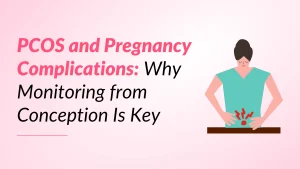Polycystic Ovary Syndrome (PCOS) is a common hormonal disorder that affects women of reproductive age. Symptoms of PCOS can include irregular periods, acne, excess hair growth, and weight gain. While weight loss is often recommended as a treatment for PCOS, it is not always possible or desirable for everyone.
There are many ways to manage PCOS without losing weight.
1. Dietary Changes
- Choose a low-glycemic-index diet: This type of diet can help to regulate blood sugar levels and reduce insulin resistance, which are common symptoms of PCOS.
- Eat plenty of fiber. Fiber can help to regulate blood sugar levels, promote weight loss, and reduce the risk of heart disease.
- Limit your intake of processed foods, sugary drinks, and unhealthy fats. These foods can contribute to weight gain, inflammation, and other PCOS symptoms.
Suggested Read: How to Manage PCOS: Dietary Tips
2. Regular Exercise
Regular exercise can help to manage PCOS symptoms in several ways, including:
- Improving insulin sensitivity: Exercise can help your body use insulin more effectively, which can help regulate blood sugar levels and reduce the risk of weight gain.
- Reducing excess androgen levels: Exercise can help to reduce the production of androgens, which are male hormones that can contribute to PCOS symptoms such as acne and excess hair growth.
- Promoting weight loss: Exercise can help you lose weight or maintain a healthy weight, which can improve PCOS symptoms.
3. Stress Management
Stress can worsen PCOS symptoms, so finding ways to manage stress is important. Some effective stress management techniques include:
- Yoga: Yoga is a mind-body practice that can help to reduce stress, improve sleep, and promote relaxation.
- Meditation: Meditation is another effective stress management technique that can help to calm the mind and body.
- Spending time in nature: Spending time in nature has been shown to reduce stress and improve mood.Suggested Read: Is Stress Really Affecting One’s Fertility?
4. Inositol
Inositol is a sugar alcohol that has been shown to improve PCOS symptoms in some women. It is thought to work by helping to regulate blood sugar levels and improve insulin sensitivity.
5. Metformin
Metformin is a medication used to treat type 2 diabetes. It has also been shown to improve PCOS symptoms in some women. Metformin works by helping the body use insulin more effectively.
6. Birth Control Pills
Birth control pills can be used to regulate menstrual cycles, reduce acne, and control excess hair growth. They can also help to prevent pregnancy, which is important for women with PCOS who are not trying to conceive.
7. Other Treatments
There are a number of other treatments that may be helpful for managing PCOS, depending on your individual symptoms. These include:
- Treatments for acne: There are a number of topical and oral medications that can be used to treat acne.
- Treatments for excess hair growth: There are a number of treatments for excess hair growth, including laser hair removal, electrolysis, and prescription medications.
- Treatments for infertility: There are a number of treatments that can help women with PCOS conceive, including fertility medications and in vitro fertilization (IVF).
Conclusion
Managing PCOS without losing weight can be challenging, but it is possible. By making lifestyle changes and considering medical treatment options, you can improve your PCOS symptoms and overall health.
t is important to remember that PCOS is a complex condition, and there is no one-size-fits-all approach to treatment. What works for one woman may not work for another. Be sure to talk to your doctor about your individual needs and develop a treatment plan that is right for you.





























